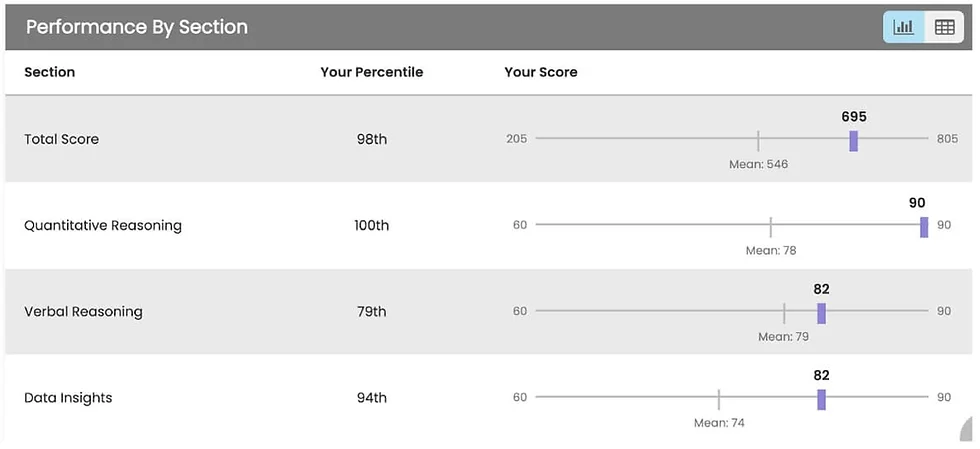GMAT Focus Edition Score. If you aspire to succeed in the competitive realm of business, it’s highly probable that GMAT, or the Graduate Management Admission Test, will be on your agenda. Here we’ll take a closer look at an essential understanding for any test-taker: the scores.
What is the structure of the GMAT? How do scores function in each section? What significance do percentiles hold, and how do business schools perceive and weigh your GMAT scores?
But before we dive in, here’s a glimpse of what we’ll be covering in greater detail:
- Understanding GMAT scores and their breakdown
- The role of percentile rankings
- The different sections of the test and their respective scoring systems
- How GMAT scores are viewed by business schools and their impact on your application
Scores
With the GMAT Focus Edition, your total score lies in your hands, hinging upon your performance across every section of the examination. The weight of each section in your score is equal.
One edge given to you by this score is its validity period – a broad five years. This gives you ample flexibility, allowing you to apply to your choice of business schools when it best suits you.
It’s essential to note, though, that drawing a direct comparison between your GMAT Focus Edition score and an older GMAT version is a misguided comparison at best.
Scoring Breakdown
Your total GMAT Focus Edition score scale operates within 205 and 805, with each total score value ending on 5. Across each section, the scores span from 60 through to 90.
- Total Score Range : 205-805
- Score Intervals : 10
- Standard Error of Measurement : 30-40 points
Score specifics for individual sections:
- Quantitative Reasoning Score:
- Score Range: 60-90
- Score Intervals: 1
- Verbal Reasoning Score:
- Score Range: 60-90 Score
- Intervals: 1
- Data Insights Score:
- Score Range: 60-90
- Score Intervals: 1
For those familiar with the previously used GMAT edition, you’ll notice that the total score scale has gone through a transformation. This alteration ensures a clear distinction can be made between the GMAT Focus Edition score and the previous GMAT exam score.
To paint a clearer picture: - GMAT Focus Edition Total Score: 205-805
- Previous Edition GMAT Total Score: 200-800
Adjustments have also been made to the score scale of the GMAT Focus Edition, reflecting changes in the global test-taking population which has become quite diverse.
Evidently, throughout the years, scores have seen quite the shift resulting in uneven distribution. This modernised score scale is the answer, enabling institutions to better differentiate between student exam performances.
What’s New in GMAT Focus Edition?
The GMAT Focus Edition now features significant key changes that set it apart.
- The total score now comprises all 3 section scores
- The content areas and constructs of the test has been refined for a narrower scope, emphasizing critical thinking, data literacy, and problem-solving skills
- The scoring algorithm has received an overhaul
- A new element, known as the question review & edit feature, is likely to change your testing behavior
Immediately after you finish the exam, your unofficial scores (Quantitative Reasoning, Verbal Reasoning, and Data Insights scores) along with your total score are presented to you on-screen.
However, it’s key to remember that you’re prohibited from recording, saving, screenshotting, or printing your unofficial score. You’ll be sent an email notification when your official score report becomes accessible in your mba.com account. For more information, check out the ‘Official Score Reports’ section.
Attention should also be drawn to the score reduction for unanswered questions. If you fail to complete each section of the exam within the allotted time, your score will be docked reflecting the number of questions left unanswered.
As such, your GMAT Focus Edition score will be a true reflection of your performance if all questions are answered within the given time limit.
Regarding your privacy and score reports – the GMAT Focus Edition scores and any personally identifiable information will only be released upon your explicit request.
This excludes cases outlined in our policy and procedure, legal requirements, and situations where it’s essential for detecting or preventing unlawful activity, or in legal or governmental proceedings.
Have you ever wondered, “what are percentile rankings?”
Essentially, percentile rankings provide you with a snapshot of how your performance compares to other test takers. This means, if your percentile ranking is at 75%, you’ve outperformed 75% of other test takers. On the flip side, 25% of test takers have performed better than you.
Here’s where it gets interesting with the GMAT™ Focus Edition. Since both the total score scale and distribution have undergone changes, a direct comparison of total scores or section scores from older versions of the exam with the GMAT™ Focus Edition won’t provide an accurate measure of performance.
Still interested in comparing your prowess on the GMAT™ Focus Edition to a previous version? It’s more appropriate to analyze percentile rankings instead of total scores.
You may be curious about the perspective of business schools! The GMAC has worked closely with these institutions throughout the redesign of the new scoring system and the introduction of the GMAT Focus Edition.
Not only are these schools attuned to these alterations, but they are also prepared to utilize the scores from the GMAT Focus Edition. Keep in mind, though, that they don’t have a preference for one version of the exam over another as scores from both are valid for five years.
Lastly, don’t forget that while your GMAT score and percentile ranking can act as a spotlight on your applications, they are merely facets of the larger gem that is your profile.
Schools use a multitude of evaluation criteria to learn more about their potential students. Your GMAT scores are a part of the story, not the entire plot.

